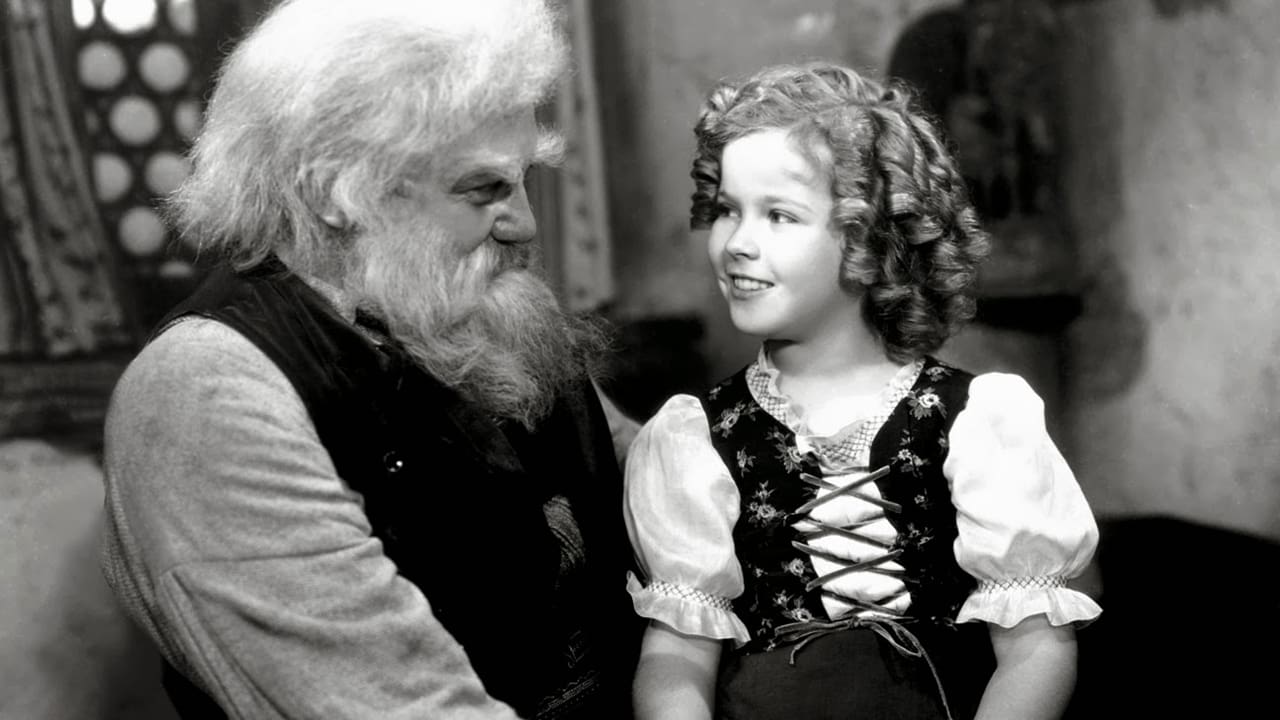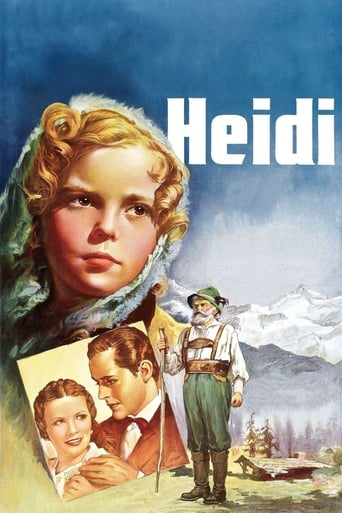



One of my all time favorites.
brilliant actors, brilliant editing
Tells a fascinating and unsettling true story, and does so well, without pretending to have all the answers.
View MoreNot sure how, but this is easily one of the best movies all summer. Multiple levels of funny, never takes itself seriously, super colorful, and creative.
View MoreBe aware that this is an adaptation of the classic story, which I read long ago. However, I have recently read a summary of the original story, and can compare the film with that. I found that the film is about half true to the book and about half a vehicle for S.T. and some of the other actors. For example, the goat herder Peter is an important character in the book, but is barely present in the film. This jibes with the general lack of interactions between Shirley and boys in her films, in contrast to her general close association with some man or men. As is true of most of her films, she is a virtual or actual orphan, nearly always lacking a real mother for at least most of the film. Her interactions with girls are also usually nearly absent, although one girl is important to this story. Of course, the main theme of the film and book: orphan Heidi restoring her grandfather's faith in people and God, was made for Shirley's stock character. Also the extreme hostility of governess Rottenmeier toward Heidi fit perfectly with the standard case where Shirley has to deal with a very unpleasant person, who may or may not be reformable. In the case of her grandfather, he was, but Miss Rottenmeier was not. "Little Miss Fix-it" was clearly present in reforming her grandfather and in encouraging wheelchair-bound Klara to make an adequate attempt to walk. In contrast, in the book, Heidi is not directly responsible for encouraging Klara to walk. Rather, her wheelchair is destroyed and she has to try to walk, and this happens much later in the story. The whole section where grandfather walks to Frankfurt to find Heidi, and his adventures in Frankfurt is a fabrication. Thus, the role of grandfather in returning Heidi to her beloved mountains is also a fabrication, as is the attempt by ex-governess Rottenmeiere to sell Heidi to a gypsy. The dream sequence, where Heidi goes to Holland and sings "Our Little Wooden Shoes", was suggested by Shirley, to help liven things up in one section. I assume that the hysterical segment where the capuchin enters the Frankfurt house and causes untold mischief, was also added to liven things up.So, why was Governess Rottenmeier so strict and mean to Heidi? For one thing, she often was slow to adapt to Rottenmeier's strict way of doing things. She was responsible for the capuchin getting into the house. She looked upon Heidi as a competitor in taking care of Klara and for approval by Klara's father. If Heidi's presence somehow enabled Klara to walk normally, Rottenmeier feared she might be considered an unnecessary expense and lose her job. Heidi's aunt pointed this out. Thus, Heidi wanted Klara to get well soon, so she could return to her mountain home, whereas Rottenmeier had a vested interest in keeping Klara believing she would never walk again. Besides the capuchin and Heidi's unfamiliarity with upper class Frankfurt living, goats are a source of comedy. A billy goat flattens Heidi with his head butt. Heidy has trouble learning to milk goats.Mary Nash(as governess Rottenmeier) and Marcia Mae Jones(as Klara) would return the following year, both as tormenters of Shirley this time, for "The Little Princess". Arthur Treacher also returns in that film , playing his stock character: the model, but comedic, butler.It's my contention that, in large part, Shirley typically represents a talkie musical female version of Charlie Chaplin's Little Tramp. Both are part child and part adult in their behavior and thinking. Both are singular entities, devoid of peer group friends or siblings or parents. Both are looking for acceptance as an adult and romance with the opposite sex(father-daughter platonic, in the case of Shirley)
View MoreWith all the Moppets running around in the mid-late 1930's, I bet none of their mothers could say that they never had a temper tantrum. On her movies, she only got mad when she needed to defend herself. Here, she must go up against a scheming aunt, a vindictive housekeeper and evil gypsies. She is able to charm embittered grandfather Jean Hersholt and win an entire Swiss mountain community over.Yet, in spite of all the sappiness, this is the best of Temple's movies and is both heart-warming and sweet. There are plenty of pathos and a bit of humor, especially the presence of an organ grinder's monkey who creates chaos in the Frankfurt house that Heidi is taken to against her will. It is obvious that depression era audiences needed someone like Shirley to brighten things up, so her talents can't be denied in that respect. If FDR hadn't been do popular, somebody might have endorsed Temple for president!As usual, there are evil grown-ups and in this case, it is Mary Nash as the nastiest housekeeper outside of "Rebecca's" Mrs. Danvers. Mady Christians is nasty as her self- serving aunt. On the good side, there is Helen Westley as a sweet blind mountain woman, Delmar Watson as her grandson who quickly befriends Heidi, Marcia Mae Jones as Clara, the Frankfurt girl whom Heidi is brought to serve as her companion, and Sidney Blackmer as Clara's kind father. Arthur Treachet offers some comical buttling and Thomas Beck is the kindly minister whom Temple tried to find a wife for.There's an unnecessarily cloying musical number that comes as part of a dream sequence rather than a plot device. It's fine for what it is bit perhaps one or two numbers in the course of the film would have served it better. Still, it is truly an enjoyable film and remains the best of the "Heidi's".
View MoreShirley Temple was one little charmer! She had the necessary "it" and I've had fun watching her work that magic that gained her legions of fans. This is the third movie of hers that I have watched. I loved Heidi, but I was so taken by her in Little Miss Marker that it will always barely edge out Heidi and the others. Heidi works her way into her grandfather's heart, and when her circumstances change, she does it with her new family. Shirley's movies were meant to thoroughly entertain and that's what this film does from beginning to end. Loyalty is a wonderful theme I've seen stressed in 2 of her movies so far, and she's a gifted little actress that embodies love and loyalty. Of course her films are predictable, but that's the fun of them. Heidi doesn't disappoint and all is well that ends well. Enjoy:)
View MoreThe story of Heidi is kind of hard to present to film-goers. As a book it's wonderful and engaging, but it's just not movie material. Thus we get versions like this, with kidnapping and gypsies and an evil witch of a Fraulein Rottenmeier who wants to keep Klara sick and bring Heidi down.But how can you not love Shirley Temple? She just takes any movie and makes it golden! And we also have the heart of the story: a little girl who teaches a grumpy old man to open up his heart again. And those two things by themselves help the movie to shine.A wonderful classic, especially for young viewers, but also good for the young at heart!
View More